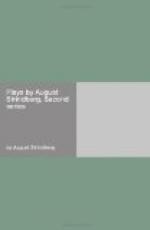AUTHOR’S PREFACE
Like almost all other art, that of the stage has long seemed to me a sort of Biblia Pauperum, or a Bible in pictures for those who cannot read what is written or printed. And in the same way the playwright has seemed to me a lay preacher spreading the thoughts of his time in a form so popular that the middle classes, from which theatrical audiences are mainly drawn, can know what is being talked about without troubling their brains too much. For this reason the theatre has always served as a grammar-school to young people, women, and those who have acquired a little knowledge, all of whom retain the capacity for deceiving themselves and being deceived—which means again that they are susceptible to illusions produced by the suggestions of the author. And for the same reason I have had a feeling that, in our time, when the rudimentary, incomplete thought processes operating through our fancy seem to be developing into reflection, research, and analysis, the theatre might stand on the verge of being abandoned as a decaying form, for the enjoyment of which we lack the requisite conditions. The prolonged theatrical crisis now prevailing throughout Europe speaks in favour of such a supposition, as well as the fact that, in the civilised countries producing the greatest thinkers of the age, namely, England and Germany, the drama is as dead as are most of the other fine arts.
In some other countries it has, however, been thought possible to create a new drama by filling the old forms with the contents of a new time. But, for one thing, there has not been time for the new thoughts to become so popularized that the public might grasp the questions raised; secondly, minds have been so inflamed by party conflicts that pure and disinterested enjoyment has been excluded from places where one’s innermost feelings are violated and the tyranny of an applauding or hissing majority is exercised with the openness for which the theatre gives a chance; and, finally, there has been no new form devised for the new contents, and the new wine has burst the old bottles.
In the following drama I have not tried to do anything new—for that cannot be done—but I have tried to modernize the form in accordance with the demands which I thought the new men of a new time might be likely to make on this art. And with such a purpose in view, I have chosen, or surrendered myself to, a theme that might well be said to lie outside the partisan strife of the day: for the problem of social ascendancy or decline, of higher or lower, of better or worse, of men or women, is, has been, and will be of lasting interest. In selecting this theme from real life, as it was related to me a number of years ago, when the incident impressed me very deeply, I found it suited to a tragedy, because it can only make us sad to see a fortunately placed individual perish, and this must be the case in still




